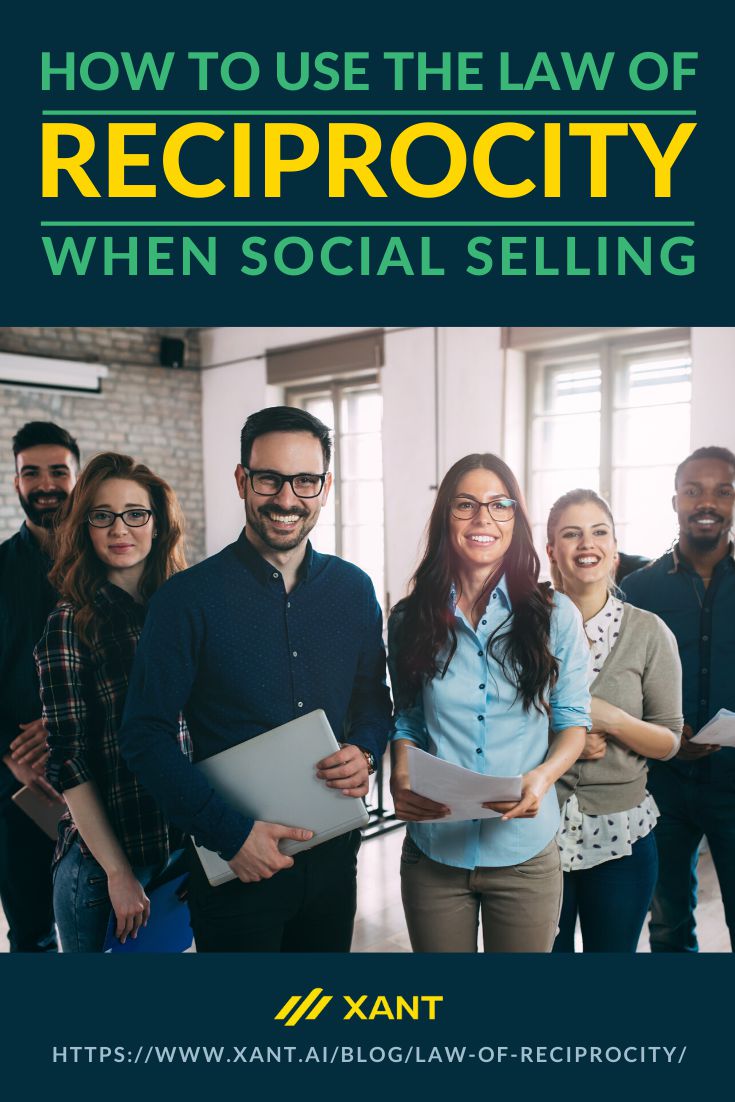How To Use The Law Of Reciprocity When Social Selling
Understand how the law of reciprocity can be an effective marketing strategy in social selling in this post.
RELATED: Social Selling | A Basic Guide For Beginners
In this article:
- The Act of Kindness in Social Selling
- Social Selling Definition
- How My Small Gesture Meant a Lot to Someone
- Give so Much They Can’t Ignore You
- Specific Actions to Get You Started
- One Surprising Psychological Secret
- Kid Tested, Mother Approved
- Social Selling with Social Media
- The Law of Reciprocity and Social Selling: Additional Tips
The Law of Reciprocity in Social Selling
Law of Reciprocity Definition: A principle of returning a favor to someone who has helped you before.
This simple law in social psychology is something you can apply during your sales process. Plus, it adds a touch of genuineness in your connections with potential customers.
The Act of Kindness in Social Selling
“No act of kindness, no matter how small, is ever wasted.” – Aesop
It is indeed true that the act of kindness in humanity is like the law of reciprocity, which also applies in social selling. I will discuss it thoroughly in this article to help you learn more about this principle.
Social Selling Definition
Before anything else, let’s start by defining what exactly social selling is.
What is Social Selling? This is the part of the sales process where you build relationships with your prospects.
Social selling hinges on how the prospect develops a trust and bond with the salesperson. With social selling, salespeople feel less like robots peddling goods to actual human beings looking to help.
How My Small Gesture Meant a Lot to Someone
Early in my career, I worked as a copywriter at a marketing agency. I met an account manager who wrote surprisingly eloquent emails.
One day, while browsing the bookstore, I spotted some writing books in the bargain bin. The next morning, I left a couple of these books on her desk.
Soon after, her husband landed a job at ESPN, and she moved to Connecticut. Years passed, and I lost touch with her.
Until out of the blue, I received an envelope in the mail from my old friend, Lori Paulenich. It contained an autographed picture of Chris Berman, the legendary ESPN sportscaster and my childhood idol.
I had forgotten about the books, but Lori had not.
My small gesture meant a lot to her because it gently nudged her toward her dream of writing professionally.
She is now a senior communications strategist in the financial services industry, and I could not be more proud of her.
This is just one of many times in my life when I have been deeply touched by the incredible power of the universal law of reciprocity.
If you’ve ever felt a strong desire to repay another person’s kindness, you probably understand the value of this international law.
To master social selling, you must first learn to leverage the law of reciprocity in an authentic, ethical way.
When you practice the principles outlined in this article, you will quickly be amazed by how many doors or career services it will open for you.
Give So Much They Can’t Ignore You

“You can have everything in life you want, if you will just help enough other people get what they want.” – Zig Ziglar
Steve Martin, the beloved comedian and actor, famously said, “Be so good they can’t ignore you.”
In social selling, that translates to:
Give so much they can’t ignore you.
Be so kind, so helpful, so thoughtful, so useful, and so generous with your talents, your resources, your network, your time, and your praise that people cannot help but notice you, like you, trust you, and yearn to see you succeed. This is what givers gain.
Effective social selling begins with the fundamental belief that your real job is to bless as many other lives as possible.
Social selling involves winning people’s trust by showing them you are willing to help them without an expectation or asking for anything in return.
That’s the beauty of the law of reciprocity in business. It works best when your generosity is genuine.
We’re not talking about a quid pro quo agreement where everything is negotiated upfront.
Let people surprise you with their imagination. What they come up with when they apply positive reciprocity will probably be 10 times better than anything you would have requested.
RELATED: 10 Social Selling Books To Help You Close Deals In Digital
Specific Actions to Get You Started
“Start where you are. Use what you have. Do what you can.” – Arthur Ashe
How you bless other people’s lives will depend on your interests, abilities, resources, and talents.
If you really want to make a difference, just show people you have faith in them. Make it abundantly clear that you believe in their abilities.
That’s the single most powerful thing you can do for another human being, and it won’t cost you a penny.
Amanda Holmes says her father, the late, great sales and leadership visionary Chet Holmes, exuded more passion for his clients’ dreams than anybody else ever had in their lives.
That was one of Chet’s secrets to connecting with people and helping them rise to new heights.
Examples of specific actions you can take include:
1. Stalking Them
If you want to do something meaningful for other people, you must first learn what matters to them. Start social selling on social media by following their social accounts, set up Google Alerts for their names, and pay attention to the content they share and the people they interact with.
Take notes on their favorite sports teams, industry topics, professional achievements, and hobbies.
2. Giving LinkedIn Recommendations
Highlight the personal and professional traits they aspire to embody and the goals and dreams they strive for every day. Align your comments with their most cherished values and goals.
Who do they want to be? How do they want to be seen?
Tell the world they are already these things. This is a good step in building LinkedIn social selling.
3. Sharing Their Content
Find something they have written or a piece of news coverage that features them. Share this content on LinkedIn, Twitter, and other social sites.
Tag them in your posts, so they know you’re sharing this stuff.
4. Send Them Relevant Information and News
If you see an article they might find highly relevant and useful, shoot them a link with a personalized note. This is a great way to stay in touch with somebody – and provide value – without killing too much time.
5. Encourage, Congratulate, and Thank
Send people notes of encouragement, congratulations, and thanks. Former Campbell Soup CEO Douglas Conant wrote 30,000 thank-you notes in a 10-year span and credits this practice with helping to re-engage employees and revitalize the company.
6. Provide Introductions
Introduce them to others in your network they might like to meet.
Don’t wait for them to ask or request from you. Be proactive in your action.
7. Offer Referrals
If you really want to make an impression, send somebody a business referral without asking for anything in return. I promise you they will remember that.
8. Sending Meaningful Gifts
The emphasis here is on meaningful. The dollar value of the gift is irrelevant.
In fact, if you send somebody a gift they consider too expensive, that might actually make them feel uncomfortable. It’s way better to zero in on a gift that aligns with their interests, goals, passions, and values.
Let’s say you find out your friend has just won a major industry award, and you know he’s a Pittsburgh Steelers fan. Send him a hand-drawn caricature of himself in a Steelers jersey being doused with Gatorade.
Any time you can make somebody laugh or promote positive emotions on someone while simultaneously boosting that person’s confidence, you are making a huge emotional impact and influence that is hard to forget.
Crush a Pinocchio-themed piñata with your bare hands. Just kidding. Just wanted to make sure you were still reading. #booyah
9. Helping Someone Close to Them
What if the people you’re trying to reach are too busy and too fortressed for you to do them a favor? That’s easy.
Just find somebody they know, like an assistant, partner, colleague, confidant, friend, spouse, yoga instructor, or hair stylist. With a little creativity, you can find a way to positively impact any person on the planet.
10. Doing a Good Deed Daily
The important thing is to form a habit of doing good deeds every day. Then, you won’t have to think so hard about your choices and actions.
They will just become a natural part of your routine.
One Surprising Psychological Secret

Don’t hesitate to seek advice and also share what you’ve learned to other people.
“Ask for money, get advice. Ask for advice, get money twice.” – Pitbull
Avanoo CEO Daniel Jacobs moved to San Francisco with no money and no connections. He started sending cold emails to Fortune 500 executives in hopes they would mentor him in his career development.
He mentioned he admired specific actions they had taken or traits they had displayed publicly.
Many of these incredibly powerful, successful, busy people responded to his emails, saying they’d be happy to share what they’d learned.
The president of NBC, who became one of Jacobs’ mentors, told him that he agreed to meet with him because everybody else always asked for money or a job, but Jacobs had asked only for advice.
Oh, and by the way, Avanoo now counts NBC among its marquee clients. How’s that for a kawinkydink?
Why would I include this story in a discussion about the law of reciprocity? Jacobs didn’t do these execs any big favors, and, in fact, he asked them for something.
This story illustrates a key psychological principle that will make you a more effective social seller: people enjoy feeling useful.
Super successful people often harbor an intense desire to repay the universe for their good fortune by sharing their wisdom with the next generation.
They remember how hard they worked and all the mistakes they made, and it excites them when they see an ambitious youngster who reminds them of themselves when they were learning the ropes.
The world is full of Mr. Miyagis just waiting to teach you how to wax on and wax off.
Seek them out. Ask for their advice.
Make them feel useful.
You’ll learn lessons — and form friendships — that will pay dividends for the rest of your life.
Social sites, like LinkedIn and Twitter, make it easier than ever to find and communicate with mentors.
Kid Tested, Mother Approved
“That’s nice, dear.” – My mom
Giving and receiving good books is a family tradition. When I was in high school, my mom gave me her used copy of David Dunn’s “Try Giving Yourself Away.”
Dunn recommended writing letters to congratulate people on their accomplishments and thank them for their contributions.
So, being the nerdy, obedient boy I was at that time, I sat on my bed with a huge stack of Christmas cards and scribbled 300 personalized notes to my classmates.
I tried my best to say something unique in each card that would make my friends feel special – and make them smile.
I referenced past conversations we had shared, the movies we had watched together, or cool things they had done on a sports team or the drama club.
But, I never thought it was a big deal, and I never expected any of them to even mention receiving one of my cards.
The outcome? Throughout the Christmas break, I was overwhelmed by greetings of good cheer at the gym, in the grocery store, at fast-food restaurants, and everywhere else I went.
My close friends loved their handwritten cards. That much could be expected, I suppose.
But, what really surprised me was how students I didn’t know responded. People who had never before spoken to me tracked me down in the cafeteria or the hallway to express genuine gratitude for their cards and this kind gesture.
A couple of months later, my classmates nominated me for Mr. Bonneville, an annual competition at my school patterned after the Miss America Pageant.
Mr. Bonneville included a popular vote. After organizers counted the votes, a faculty member told me I had won.
I commented that it must have been close.
Without hesitation, she replied, “I never said it was close.”
The law of reciprocity strikes again.
Social Selling with Social Media
Nowadays, a lot of salespeople look to social media for networking and to establish a better connection and build trust with a potential customer.
Although half of the term of social selling is the word ‘selling,’ what you should focus more on is the first part.
Make sure you have good engagement on social media. You can do this by:
- Creating engaging and relevant content for your social media page/s
- Joining relevant groups that your target market is in, and participating actively in them
- Connecting directly to some of your prospects
- Engaging with posts or content related to your brand, whether created by you or not
The Law of Reciprocity and Social Selling: Additional Tips
Incorporating the law of reciprocity into your social selling strategy can be useful if you know what to do. To help supplement your knowledge of this selling technique, here are some tips you might be interested in following:
1. Reel Them In Before Trying to Build a Relationship
Before you take your relationship with a prospect to the next level, you should first make sure you do your due diligence. If you try and establish a connection with your prospect too soon, then you’re going to get outright rejected.
You have to first establish yourself as a person they’d be interested in. This is where the Law of Reciprocity comes in.
2. Always Do Your Research
Supplementing your actions with knowledge is always a good idea, even when social selling. The Law of Reciprocity is a look into human behavior.
Do your research on the psychographics and demographics of your target customer. By doing your research, you’ll have a better starting point when connecting with your prospects.
It’ll give you a better idea on what they need or want from a connection. In this way, you’ll know what they really need and what you can offer them.
For example, your prospect needs guidance in your particular niche. By creating high-quality content on your social media pages, your prospect will see you as an authority they can turn to for guidance.
Keep giving them high-quality content without expecting anything in return just yet. Once you‘ve proven yourself valuable and relevant, they might reciprocate and connect with you or accept your invitation to connect.
3. Note That Social Selling Is a Constant Process
Engaging with your audience isn’t something you should only do every once in a while. It’s something you do regularly, otherwise, you’re going to lose their attention.
Social selling is a part of your selling process and not an afterthought you do only when you want to.
Engage with your audience as much as possible. Be a constant presence in their journey.
When you show genuine interest in other people, they naturally become interested in you, and they will go out of their way to do nice things to help you win and succeed.
I hope the principles and strategies in this article will inspire you to take your social selling to a whole new level. Keep the law of reciprocity in mind, and do small things for others without expecting anything in return.
You might just be surprised at what kind of connections and opportunities these small acts of kindness open up for you.
What are your experiences with the law of reciprocity in helping others succeed? Share them in the comments section!
Up Next:
- How Artificial Intelligence Is Changing B2B Social Selling
- How To Fit Social Selling Into Your Cadence Strategy
- How To Be Remarkable, Memorable And Compelling In A Remote Call
Free eBook: Cold Calling Is Dead, Thanks To LinkedIn
Learn to use LinkedIn for pre-call research that increases appointment rates to 16.7%.
Related Content:
- LinkedIn InMail And Email Secrets For A 60% Response Rate
- 31 Twitter Tips, Tools, And Best Practices
- LinkedIn Social Selling Tips From Top Social Sellers
- Creating Epic Content On A Shoestring Budget

Editor’s Note: This post was originally published on November 25, 2015, and has been updated for quality and relevancy.
